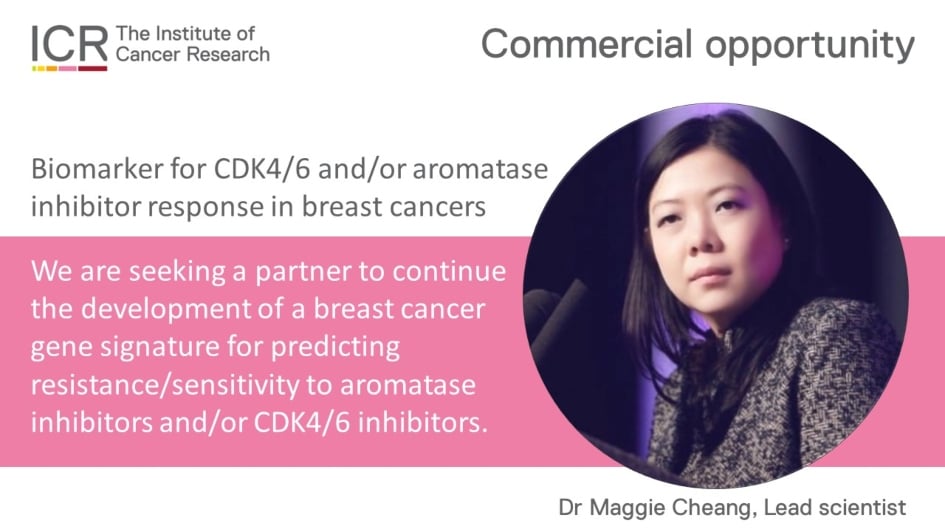
The most common form of breast cancer, accounting for around 80% of women with the disease, is oestrogen receptor-positive breast cancer – which needs oestrogen to grow and survive.
Women with early-stage cancers of this type have surgery to remove their tumour and then usually take ‘aromatase inhibitor’ drugs, a hormone treatment that blocks a protein involved in the production of oestrogen.
Aromatase inhibitors – the effectiveness of which was proved in part by researchers at the ICR and our partner hospital, The Royal Marsden – greatly reduce the risk of the disease coming back. However, they don’t work for all: between 30% and 65% of tumours do not respond, and resistance can also occur after initial successful treatment.
A further class of drugs discovered and developed over the past decade or so has made a big difference to women with advanced oestrogen receptor-positive breast cancer.
CDK4/6 inhibitors – such as palbociclib, ribociclib and abemaciclib – offer an option for those women whose cancer has progressed despite hormone therapy, and can dramatically prolong life. Indeed, ICR researchers led a major clinical trial that established the effectiveness of the first-in-class CDK4/CDK6 inhibitor palbociclib (also known as Ibrance) in advanced, metastatic breast cancer.
Gap in treatment
There is a current gap in treatment, however. Some women do not respond to treatment with aromatase inhibitors, but will benefit from taking CDK4/6 inhibitors earlier on in treatment.
And now, researchers at the ICR have made a breakthrough by developing a new test that could spot them much more quickly than they are currently – enabling them to receive better, personalised treatment.
Guiding clinical decision-making
When treating breast cancer patients, it’s important that clinicians have all the available tools and information to make the best clinical decision – balancing the likelihood of tumour response against the risk of side effects.
Previously, ICR researchers led a phase III trial (the POETIC study) showing that administering an aromatase inhibitor for two weeks before surgery, then measuring the growth marker Ki67 in tumour samples collected during surgery, can provide valuable information on patients’ likely response to hormone therapy.
Most recently, ICR researchers developed a new biomarker tool, incorporating the activity of 81 key genes, which can predict which women may benefit from standard hormone therapy or with treatment with a CDK4/6 inhibitor. This was derived from clinical data in publications, inhouse laboratory models and the analysis of samples collected from the POETIC trial.
The novel gene expression signature is known as AIR-CIS – Aromatase Inhibitor Resistant-CDK4/6 Inhibitor Sensitive.
AIR-CIS has the potential to be developed into a predictive biomarker to help guide treatment selection for postmenopausal women with hormone receptor-positive breast cancer. The ICR has filed a European patent application claiming the method for predicting which patients will most benefit from additional treatment with a CDK4/6 inhibitor alongside hormone therapy (PCT/EP2021/07368).
Unique collaboration opportunity
The lead inventors and scientists on the project are Dr Maggie Cheang and Professor Mitch Dowsett. Dr Cheang leads the integrative genomics analysis team at the ICR and has extensive multidisciplinary experience in cutting-edge fields including biomedical sciences, cancer genomics and bioinformatics, pathology and clinical trials.
She has experience of working with industry and co-invented a 50 genes-based classifier for the intrinsic subtypes of breast cancer, commonly known as PAM50 and currently licensed and used commercially as Prosigna®.
Professor Dowsett is a world-leading expert on the hormonal aspects of breast cancer whose research was instrumental in the clinical development of aromatase inhibitors.
Now Dr Cheang and colleagues are seeking industrial partners to collaborate on the commercial development and transition of AIR-CIS to the clinic to achieve maximum patient benefit.
Dr Cheang says: “Molecular profiling of tumours allows identification and development of new biomarkers that can increase our understanding of disease and treatment resistance.
“Our expert team has substantial experience of translating research into clinical practice in collaboration with industry, and this project represents an exciting new opportunity for a partner to help translate our biomarker into a commercially available test. Ultimately, we hope to develop a new test that could help guide treatment and prolong the lives of women with oestrogen receptor-positive breast cancer.”
Find out more
Read our brochure for more details on this partnering opportunity.
See our other opportunities – in areas from anti-cancer vaccines and targeted small molecule discovery and development, to genetic biomarkers and tumour imaging tools.
comments powered by